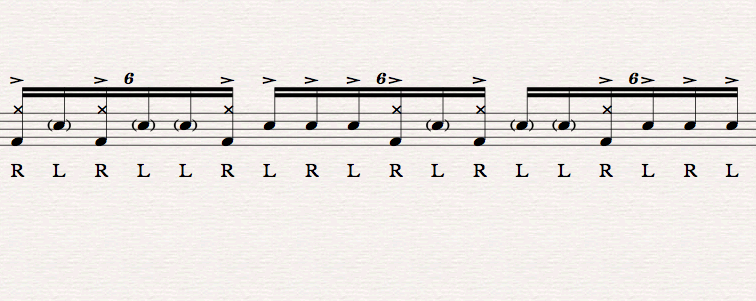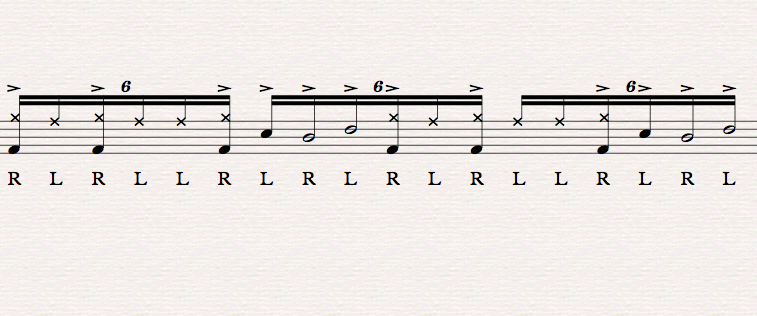When asked to give his single best piece of advice to drummers, the great Bruce Becker responded with the following 3 words:
“ASSIMILATE… IMITATE… INNOVATE…"
When we take a look at the true GREATS… the Vinnies, the Gadds, the Weckls, the [insert your favorite drummer here]… what is it exactly that they all seem to share in common with each other?
Besides being incredibly talented, the answer is that they are the ones who have been able to successfully embody each of these three principles at a world-class level.
This week, we'll take a close look at each of these principles; first by defining them and then by explaining how they directly apply to your drumming. However, please keep in mind that these principles don’t just apply to drumming (or even music for that matter)… they can be applied to virtually ANY field of study.
Along the way, we'll complete 3 simple exercises together where you’ll learn to be like the greats while simultaneously developing your own unique "you-ness."
Ready? Let’s get started.
PRINCIPLE 1 = ASSIMILATE
DEFINITITION
assimilate |əˈsiməˌlāt|
verb [ with obj. ]
-take in (information, ideas, or culture) and understand fully: "Marie tried to assimilate the week's events."
EXPLANATION
Many of us listen to our favorite drummers and think, “Wow, that’s amazing/incredible/insane! If only I could play like that!” The truth is that you really can learn to play ANYTHING… but you have to first have to understand exactly what it is that you’re hearing.
Looking at the definition of “assimilate” (shown above), sure... we can easily become inspired by what we hear (“take in”) from our favorites, but where many of us fall short is in not taking that crucial next step: learning what’s REALLY going on (“understand fully”).
It IS possible to demystify what seems impossible; we just need to take what we’ve heard and place it under a microscope. We need to ASSIMILATE the idea.
ACTION STEP 1 of 3 - ASSIMILATE: TRANSCRIBE ONE SIMPLE IDEA
- The next time you listen to your favorite drummer, pick something SPECIFIC that you enjoy hearing (or don’t quite understand yet).
- Start small. Choose one bar of a groove you like, or one cool chop/lick that resonates with you.
- Listen to the phrase over and over… and over… and over… and over.
- Be able to sing the idea out loud. Internalize it.
- Once you’ve internalized the idea you’ve chosen, don’t play it on the drums just yet.
- Instead, write it out on staff paper, note for note.
- Make sure to clearly define/notate all details of the idea (accents, stickings, orchestration, etc.). There’s something special about seeing the idea visually that allows you to TRULY assimilate it.
STEVE’S EXAMPLE:
To help put things in context, I’ll complete these action steps with you along the way. Here’s a transcription of a lick I really enjoy by one of my favorite drummers, Adam Deitch. You can hear it on the song “The Last Suppit" by Lettuce when Adam takes a drum solo at the very end.
Okay. We’ve taken an idea that inspires us and have absorbed it fully. We've ASSIMILATED it. We’re ready for the next step: IMITATE.
PRINCIPLE 2 = IMITATE
DEFINITITION
imitate |ˈiməˌtāt|
verb
-take or follow as a model: "his style was imitated by many other writers."
-copy (a person's speech or mannerisms): "she imitated my Scottish accent."
EXPLANATION
Musicians are CONSTANTLY imitating one another, that’s the beauty of the art form! Music isn’t created in a vacuum, it’s created by musicians who are influenced by other musicians!
The difference is that now, you’re well ahead of the game compared to most…. because you’re not just blindly attempting to imitate what you’ve heard… you’ve placed the idea under a microscope first so that you understand its elements. This will make it much easier to play, and play well.
ACTION STEP 2 of 3: IMITATE: PLAY THE IDEA ON THE DRUMS
-Begin playing the idea on the drums. Start very slowly and just focus on accuracy at first. Speed will come with time.
-Are you using the correct dynamics/phrasing/orchestration/accents of the idea?
-Are you playing the exact sticking used?
-If you recorded yourself and played it back, would it sound exactly the same as the original drummer? If not, how can you better-match the vibe? You’re not trying to be YOU just yet, you’re trying to IMITATE. Be critical and focus on the details.
STEVE’S EXAMPLE:
Here’s a video where I’m playing the Adam Deitch lick in context. (skip to :55)
PRINCIPLE 3 = INNOVATE
DEFINITITION
innovate |ˈinəˌvāt|
verb [ no obj. ]
make changes in something established, especially by introducing new methods, ideas, or products: "the company's failure to diversify and innovate competitively."
EXPLANATION
Let’s recap briefly. First, you started by identifying an idea you enjoyed hearing, and now can understand it (ASSIMILATE). Next, you spent time learning how to play it note-for-note (IMITATE). You’re finally ready for the last step... How can you take what you’ve learned and apply it to YOUR world? What are the core takeaways from the original idea and how can you make slight changes to turn it into something completely different and unique?
ACTION STEP 3 of 3: > INNOVATE: COME UP WITH ONE NEW VARIATION OF YOUR OWN
Change just ONE aspect of the idea you’ve learned. Here’s a few ideas of ways to change it up:
-Different tempo
-Different feel (swung, straight)
-Different time signature
-Different/opposite sticking
-Different rhythmic values (if it was triplets, change it to 16th notes, etc.)
-Different dynamic level
-Different accents
-Different orchestration (what drums/cymbals you play the idea on)
STEVE’S EXAMPLE:
Here’s one variation on the Adam Deitch lick that you can use. Which variable did I adjust? I simply changed the orchestration to now include the hi-hats and toms:
See how many variations you can come up with on your own. Don’t try to create a million variations at once… otherwise you will forget them all. Just focus on one variation at a time and allow some time for it to become part of your vocabulary. Remember to be patient… it’s about quality, not quantity.
ACTION = RESULTS.
Seriously… it’s not enough to just read this article… you have to take action in order to grow.
I can assure you that if you’ve followed the action steps above, you’re most likely feeling awesome right now! Think about everything you’ve accomplished in a very short amount of time: You’ve come to appreciate/understand what the greats have done, you’re now able to channel the vibe of that drummer when needed, and you’ve also come up with brand new grooves/licks of your own!
Imagine if you were to repeat these 3 principles over and over with all of your favorite drummers… you’d soon find yourself becoming better on your instrument than you ever could have imagined. You just have to do it!
Lastly, I want to leave you with this: How can you apply these 3 principles to other areas in your life? (ex: fitness, sports, finance, business, cooking, the list goes on…). For nearly anything you’d like to become great at: 1) study someone who is already great 2) learn how to do what they do, and then 3) innovate by changing the variables and making it your own.
Good luck and happy drumming!
100 RULES FOR DRUMMERS
Thanks so much for reading this week's article! Each week, I select one person from "100 RULES FOR DRUMMERS” and write an article based on the three-word rule they offered. My goal is to provide questions, thought experiments, and specific action stepsyou can take in order to improve both your DRUMMING and LIFE!
If you personally found this article helpful, please pay it forward by sharing it with just one person in your life that you think would become inspired from reading it!
Subscribe to 100 RULES FOR DRUMMERS by clicking HERE.
If you have any questions, comments, or feedback, I’d LOVE to hear from you! Please feel free to reach out anytime using the comments section below or by emailing me at steve@stevesuchdrums.com
Thanks,
-Steve
ABOUT BRUCE BECKER
Thanks to Bruce Becker for offering his 3 words of advice to drummers (ASSIMILATE, IMITATE, INNOVATE), and for inspiring me to write this week's article!
What do Neil Peart, Steve Smith, Dave Weckl, and Bruce Becker have in common.....? All of these drummers have sought the unique insights and perspective on balance and motion from drum "guru" Freddie Gruber.
Gruber's reputation rests upon an approach that stresses a more efficient use of the drummer's anatomy. Gruber has often been referred to as the "zen" master of teaching. This rare insight into this approach was spurred on by Freddie's close 40 year friendship with Buddy Rich. It can clearly be seen in Buddy's playing.
Bruce started his studies with Freddie back in 1977. It was at this time when Freddie's activity was at its height. Bruce not only studied for 8 years, but watched Freddie teach. Over the years Bruce was present for hundreds of students and became increasingly aware of the value of Freddie's approach. He was also able to watch the evolution and changes Freddie made in response to musical styles and drum innovations of the time. "I was there at a unique time during the late 70's and mid 80's. The pace at which I saw Mr. Gruber evolve was mind boggling. I would literally spend hours and hang......and this went on for years", Bruce recounts in a June '93 interview in Belgo Beat (Belgian Drum Magazine).
Upon relocating to Europe in 1992, Bruce spent quite a bit of time traveling with Gruber. Together they did a series of Clinic and Masterclasses in Belgium, the Netherlands and Germany. While Gruber would pontificate, Bruce would demonstrate on the drums. At this time Bruce also became the Head of the Drum Dept. at A.I.M. (American Institute of Music) in Vienna, Austria. There he spent time actively putting his thoughts and concepts together based on all that Gruber had shared with him.
Bruce's conceptual approach and unique ability yields great results. His equation is Balance + Motion = Emotion. He offers the most comprehensive insight into the teachings of Mr. Gruber, and has been teaching since '82. Since returning to Los Angeles, Bruce teaches privately and has a steady stream of working drummers.
Bruce has worked with diverse artists such as Suzanne Somers, Beach Boy Family and Friends, Andy Sheppard, Deborah Henson-Conant, David Becker, Joe DiOrio, Herb Ellis, Barbara Dennerlein, Suns of the Dead, and Frank Gambale.




